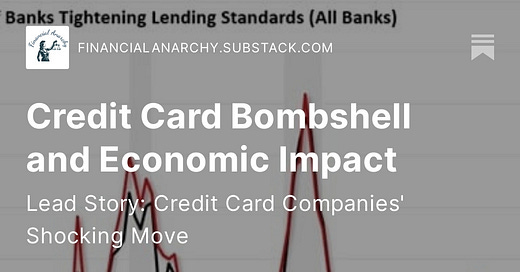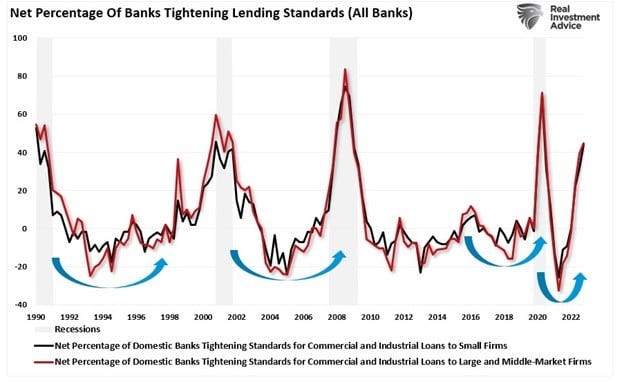Credit Card Companies' Shocking Move
Today's lead story unveils a credit card bombshell that will leave you astounded. Credit card companies are gearing up to take unprecedented actions with far-reaching consequences for the economy. Brace yourself for the devastating effects that lie ahead.
Let's now switch to CNBC, where we discovered our headline: "Record High Average Credit Card Interest Rate at a Staggering 20.69%." However, experts claim that there are still 0% offers available while supplies last.
Understanding the Significance
Why does this matter so much? To comprehend the gravity of the situation, we need to consider the concept of a soft landing or no landing in the economy, particularly from the perspective of the Federal Reserve (Fed). What is required to achieve this? An increase in consumer spending, especially on discretionary items. Unfortunately, higher interest rates, particularly regarding credit cards, present a challenge. They force borrowers to allocate more funds towards interest payments, leaving less for discretionary spending. This problem intensifies because, in a matter of months, student loan repayments will commence, further reducing the discretionary funds available for the economy. Unfortunately, this issue is bound to worsen.
Over the past year, the Central Bank has raised interest rates ten times, representing the swiftest pace of tightening since the early 1980s. Consequently, credit card rates have skyrocketed to an all-time high. Although the Fed has momentarily halted its rate hiking campaign, the cumulative effect remains significant. This means cardholders will not receive any respite. As the Fed hits the pause button, rates continue to rise and are likely to remain at these elevated levels. Consequently, minimum payments have also surged, leaving borrowers without relief precisely when they need it most.
Most credit cards feature variable interest rates directly linked to the Fed's benchmark rate. As the federal funds rate increases, so does the prime rate, and credit card rates follow suit. Importantly, there is usually a two-month lag before the rates adjust accordingly. Therefore, over the next month, we may witness even higher rates. Moreover, if the Fed's plans materialize, the situation will deteriorate further.
The average credit card now imposes a record 20.69% interest rate, nearly five percentage points higher than the previous year's starting point. While the recent Fed decision might temporarily prevent interest rates from rising this month, the persistently high credit card rates consumers face are here to stay. Unfortunately, this timing is disastrous. As weekly unemployment claims increase, indicating a slowing economy, record-high debt service becomes an urgent priority for households burdened with high-cost variable-rate debt. However, data reveals that this priority is not being adequately addressed.
Individuals are consistently seeking higher limits and utilizing more of their available credit. Nonetheless, there comes a point when this trend reaches its limit, and consumers become financially stretched. They can no longer borrow, resulting in a shift towards paying off credit card debt. Consequently, more funds are diverted from the discretionary side of the economy, which desperately requires increased spending.
Experts often advise individuals to transfer balances from high-interest-rate cards to those offering no-interest or low-interest balance transfers. This approach can significantly reduce the amount of interest paid, but securing such options remains a challenge. The concerning fact is that consumer loans, including credit cards and other revolving plans at commercial banks, are sitting just below a trillion dollars in revolving debt. This debt is highly sensitive to any actions taken by the Fed. While the Federal Reserve's ability to manipulate monetary policy through the federal funds rate is limited in many areas, it remains highly effective when influencing revolving credit card and loan balances. The balances may not change, but the interest rate does. As rates rise, consumers and borrowers are burdened with higher payments, exacerbating an already critical issue.
The situation is poised to worsen as Fed Chair Jerome Powell indicates that higher interest rates are necessary to tame the economy. The timing and extent of these rate adjustments will be determined during upcoming meetings. Notably, this comes as no surprise since this is a recurring statement from the Fed. The challenge lies in their forward guidance, which predicts a substantial increase in rates. Powell emphasizes that policymakers expect interest rates to rise further to bring U.S. growth below its long-term trend and counter inflationary pressures. The timing and frequency of additional rate hikes will be determined based on incoming data. Powell is currently attending congressional meetings, and he will undoubtedly reiterate that his primary focus is curbing inflation. While the Fed possesses a couple of policy tools, including quantitative tightening, the federal funds rate remains their primary tool. Powell will likely reiterate that interest rates must increase until inflation subsides. After pausing a series of interest rate hikes for the first time in 15 months, the Federal Open Market Committee has left rates at a range of five to five and a quarter percent. Nevertheless, credit card companies are preparing to respond to the Fed's projections in the coming months. The Fed's estimations suggest rates will reach 5.6% by the end of the year, implying two additional quarter-point rate hikes. These projections are based on persistently surprising inflation levels and what the Fed describes as a strong labor market, although signs of labor market weakness have become evident. If the Fed's predictions materialize, credit card holders will face higher interest rates and minimum payments. Considering the impending student loan repayments, the timing couldn't be worse. Consequently, the US economy may grind to a halt between the third and fourth quarters as debt service obligations mount, and individuals struggle to meet their financial obligations.
Here we can see this chart of the Consumer Price Index against the four-week moving average initial claims. And here we can note that any big, large move down in the Consumer Price Index where you see the blue line going down, I want you to know it is usually associated with a large rise in weekly unemployment claims. This is again the four-week moving average. So this suggests that in order to bring inflation down as Powell wants, that soft landing's not going to happen. It's going to hit the labor market at the worst possible time, again as they face those credit card payments going higher and those student loan repayments coming back.
In conclusion, the current situation regarding credit card interest rates presents a significant challenge for consumers and the overall economy. With rates reaching record highs and the Federal Reserve contemplating additional rate hikes, borrowers are burdened with higher minimum payments and greater debt service responsibilities. This comes at a time when the labor market shows signs of weakness, and inflationary pressures persist. The timing is particularly unfavorable, given the impending student loan repayments. As consumers continue to rely on their available credit and face difficulties making ends meet, the discretionary side of the economy is expected to suffer. Individuals need to explore alternatives such as balance transfers to reduce interest payments. However, the overall outlook suggests that the US economy may experience a slowdown shortly as mounting debt obligations take their toll. Urgent attention and effective measures are required to address the challenges posed by soaring credit card rates, diminishing labor market conditions, and the rising cost of living.
We urge you to subscribe, like, and share this information with your friends, family, and colleagues to help spread awareness about the shocking credit card bombshell that awaits us. The economic impact of record-high credit card interest rates is far-reaching and can affect us all.
By subscribing to our channel, you'll stay updated on the latest news and insights, empowering you to make informed financial decisions. Hit that subscribe button now and be a part of our community dedicated to understanding the complexities of the economy.
Liking this video will not only show your support but also help boost its visibility, reaching more people who need to be aware of the credit card crisis. Your simple gesture can make a big difference in spreading this important message.
Lastly, don't forget to share this video with your social networks. Together, we can ensure that as many individuals as possible are informed about the devastating economic impact of soaring credit card rates. By sharing, you can play a vital role in helping others protect their finances and make proactive choices.
Remember, the more people we reach, the stronger our collective voice becomes. Subscribe, like, and share today to warn others about the credit card bombshell and its potential consequences for our economy.
Thank you for your support!
Like, Subscribe, and Share to Spread the Word!
Subscribed
If you found this analysis informative and eye-opening, we invite you to like, subscribe, and share this video to help us spread the word. Together, we can build a community of Financial Anarchy advocates who are dedicated to promoting financial literacy and advocating for sound monetary policies. By amplifying our message, we can empower individuals to take control of their financial well-being and contribute to a more equitable and sustainable future.
Support Our Work with a Bitcoin Donation
We also offer the opportunity to support our work and help us continue building the Financial Anarchy community. If you would like to make a contribution, we gratefully accept donations in Bitcoin. Your support will enable us to create more educational content, engage in meaningful activism, and further our mission of challenging the status quo. To donate, please use the following Bitcoin address:
1EkmtWDYzuhkiv3iYozKVnZFxsQxDetnfH
Thank you for joining us on this journey of understanding and change. Together, we can shape a brighter financial future for all.









